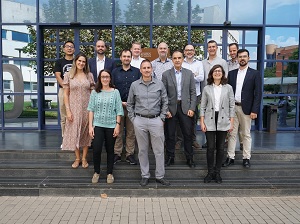ALL-IN-Zero
The UPV leads the European project ALL-IN-Zero, which seeks to develop the greenest propulsive system for vehicles on the market
[ 08/03/2023 ]
The Universitat Politècnica de València (UPV), through the CMT-Motores Térmicos (CMT) Research Institute, leads ALL-IN-Zero, a project funded by the European Union whose objective is to develop a propulsive system for vehicles that allows using any hydrogen carrier fuel to generate electricity and mechanical power with zero emissions. The Instituto de Tecnología Química (ITQ), a joint research center of the UPV and the Spanish National Research Council (CSIC), is also among the project’s partners.
Ricardo Novella, the principal investigator of the project and professor at the UPV, points out that “the system will allow onboard hydrogen produced to be used in a fuel cell or an internal combustion engine without emissions. It is a propulsive system that could hardly be greener. There are many challenges to achieve this ambitious goal; therefore, in addition to the UPV and the CSIC, another German research center and a leading company in the Austrian automotive sector are also participating in the project".
Maximum energy use of the fuel, CO2 capture and neutral emissions
Long-distance freight transport is unsuitable for using batteries as a power source. Although technologies evolve, currently and in the medium term, the ratio between the battery’s weight and the energy they can store is very high, and their recharging time is very long. On the contrary, using more sustainable fuels, such as ammonia, natural gas, biogas, or alcohol produced from renewable sources, may be appropriate for this sector.
Ricardo Novella explains that “the novelty of the project is that these fuels will be onboard processed in a compact membrane reactor in which the hydrogen will be produced and electrochemically compressed; then it will be transformed into mechanical or electrical energy by a combustion engine or a fuel cell, which will be optimized in our laboratory”.
The ITQ will be in charge of developing this reactor, whose CO2 emissions can be easily captured, contrary to the conventional combustion of carbon-based fuels in the engine.
“In situ generation of compressed H2 will be efficiently achieved by proton pump catalytic systems, which integrate very well thermally with the rest of the propulsive system. This will enhance maximizing the energy use of the fuel and enable the capture of CO2, achieving emission neutrality. This concept and technology are exclusive and have been developed between CMT and ITQ institutes, using current fuel logistics”, José M. Serra, an ITQ researcher, points out.
Hydrogen, the blood of the ALL-IN-Zero propulsive system
Another advantage of the project is that hydrogen is produced and consumed in the system as a temporary pollutant-free vector that appears and disappears. “Hydrogen is used internally and is neither seen nor exits the system, as the blood in our body. In this way, hydrogen would act as the blood of our revolutionary propulsive system”, José M. Serra points out.
The project will assess the technological feasibility of integrating the aforementioned systems at a laboratory level. Still, it will also seek their scaling and use in a virtual vehicle and realistic driving conditions based on complex computer simulation models. “Thus, the aim is to compare the solution proposed in this project with other existing ones to evaluate the decarbonization of propulsive or electricity production powerplants in the shortest possible time”, Jaime Martín, professor and researcher at the CMT institute, comments.
International collaboration
Funded by the Horizon Europe research programme, the project involves Forschungszentrum Jülich (Germany), a research center of renowned European prestige, and the leading company in the automotive sector AVL List GmbH (Austria), together with its Spanish subsidiary AVL Ibérica SA.
Outstanding news
 ARWU 2023
ARWU 2023
The Shanghai ranking reaffirms the UPV as the best polytechnic in Spain for yet another year
 Science Meets Regions CV 2023
Science Meets Regions CV 2023
The UPV and the Almussafes City Council begin a collaboration in search of solutions to maintain the automobile sector in the Valencia Region
 Scientific reference
Scientific reference
Avelino Corma, Distinguished Research Assistant at the UPV, awarded an Honorary Doctorate by the University of Huelva
 Micronanofabs NTC UPV-PERTE CHIP Conference
Micronanofabs NTC UPV-PERTE CHIP Conference
María Marced, TSMC Europe president: "The sector's future is bright, the market is expected to double by 2030"
 Goya nomination
Goya nomination
Javier Polo, who holds a degree in Audiovisual Communication from the UPV, directs the successful short documentary Una terapia de mierda
 Sant Carles Medal 2023
Sant Carles Medal 2023
The Faculty of Fine Arts of the UPV awards the Sant Carles Medal 2023 to outstanding Valencian art and culture figures







